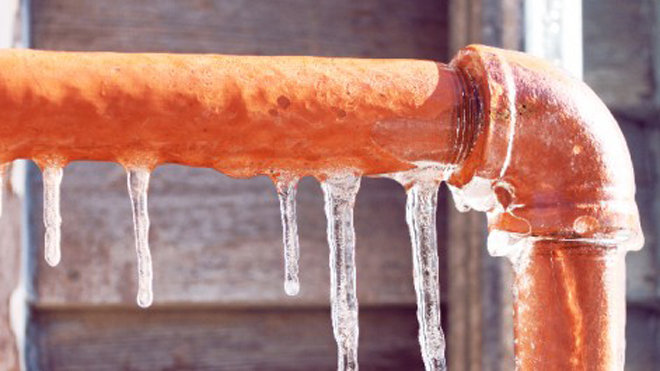Shielding Your Pipes from Freezing Issues: Key Approaches
Shielding Your Pipes from Freezing Issues: Key Approaches
Blog Article
How do you really feel with regards to Winter Plumbing Precautions: Preventing Frozen Pipes?

Winter can ruin your pipes, specifically by freezing pipelines. Right here's just how to prevent it from occurring and what to do if it does.
Intro
As temperature levels drop, the danger of icy pipelines increases, potentially causing pricey repairs and water damage. Recognizing exactly how to prevent icy pipes is critical for house owners in cold environments.
Understanding Icy Pipes
What triggers pipes to freeze?
Pipelines freeze when revealed to temperatures below 32 ° F (0 ° C) for expanded periods. As water inside the pipes ices up, it broadens, putting pressure on the pipe walls and possibly causing them to burst.
Dangers and damages
Frozen pipelines can lead to supply of water disruptions, residential property damages, and costly fixings. Burst pipelines can flooding homes and create considerable structural damages.
Indicators of Frozen Piping
Recognizing icy pipelines early can stop them from breaking.
Just how to recognize icy pipes
Search for reduced water flow from faucets, uncommon smells or noises from pipes, and visible frost on revealed pipelines.
Prevention Tips
Insulating vulnerable pipelines
Wrap pipes in insulation sleeves or make use of warmth tape to safeguard them from freezing temperatures. Concentrate on pipes in unheated or exterior locations of the home.
Heating strategies
Keep interior areas effectively heated, specifically areas with pipes. Open closet doors to allow cozy air to circulate around pipelines under sinks.
Protecting Outside Pipes
Garden pipes and outdoor faucets
Separate and drain garden tubes before wintertime. Mount frost-proof spigots or cover outside taps with shielded caps.
What to Do If Your Pipes Freeze
Immediate activities to take
If you think icy pipes, maintain taps open up to eliminate stress as the ice thaws. Utilize a hairdryer or towels taken in warm water to thaw pipelines slowly.
Long-Term Solutions
Structural adjustments
Take into consideration rerouting pipelines away from exterior wall surfaces or unheated areas. Add added insulation to attic rooms, basements, and crawl spaces.
Updating insulation
Purchase premium insulation for pipes, attic rooms, and walls. Correct insulation helps keep constant temperature levels and minimizes the risk of frozen pipelines.
Final thought
Preventing frozen pipelines requires positive measures and quick feedbacks. By recognizing the reasons, indications, and safety nets, house owners can safeguard their plumbing during winter.
Helpful Tips to Prevent Frozen Pipes this Winter
UNDERSTANDING THE BASICS: WHY PIPES FREEZE AND WHY IT’S A PROBLEM
Water freezing inside pipes is common during the winter months, but understanding why pipes freeze, and the potential problems it can cause is crucial in preventing such incidents. This section will delve into the basics of why pipes freeze and the associated problems that may arise.
THE SCIENCE BEHIND FROZEN PIPES
When water reaches freezing temperatures, it undergoes a physical transformation and solidifies into ice. This expansion of water as it freezes is the primary reason pipes can burst. As the water inside the pipe freezes, it expands, creating immense pressure on the walls. If the pressure becomes too great, the pipe can crack or rupture, leading to leaks and water damage.
FACTORS THAT CONTRIBUTE TO PIPE FREEZING
Low Temperatures: Extremely cold weather, especially below freezing, increases the risk of pipes freezing. Uninsulated or Poorly Insulated Pipes: Pipes located in unheated areas, such as basements, crawl spaces, or attics, are more prone to freezing. Insufficient insulation or lack of insulation altogether exacerbates the problem. Exterior Wall Exposure: Pipes running along exterior walls are susceptible to freezing as they encounter colder temperatures outside. Lack of Heating or Temperature Regulation: Inadequate heating or inconsistent temperature control in your home can contribute to frozen pipes. PROBLEMS CAUSED BY FROZEN PIPES
- Pipe Bursting: As mentioned earlier, the expansion of water as it freezes can cause pipes to burst, resulting in significant water damage.
- Water Damage: When pipes burst, it can lead to flooding and water damage to your property, including walls, ceilings, flooring, and personal belongings.
- Structural Damage: Prolonged exposure to water from burst pipes can compromise the structural integrity of your home, leading to costly repairs.
- Mold and Mildew Growth: Excess moisture from water damage can create a favorable environment for mold and mildew growth, posing health risks to occupants.
- Disrupted Water Supply: Frozen pipes can also result in a complete or partial loss of water supply until the issue is resolved.
WHY CERTAIN PIPES ARE MORE PRONE TO FREEZING
- Location: Pipes located in unheated or poorly insulated areas, such as basements, crawl spaces, attics, or exterior walls, are at higher risk of freezing.
- Exterior Pipes: Outdoor pipes, such as those used for irrigation or exposed plumbing, are particularly vulnerable to freezing as they are directly exposed to the elements.
- Supply Lines: Pipes that carry water from the main water supply into your home, including the main water line, are critical to protect as freezing in these lines can affect your entire plumbing system.
- Underground Pipes: Pipes buried underground, such as those connected to sprinkler systems or outdoor faucets, can be susceptible to freezing if not properly insulated.
https://busybusy.com/blog/helpful-tips-to-prevent-frozen-pipes-this-winter/

I'm certainly very taken with How to Prevent Your Pipes From Freezing and I am praying you liked the entire entry. Enjoyed reading our review? Please quickly share it. Help someone else find it. Kudos for being here. Please check our blog back soon.
Click Here Report this page